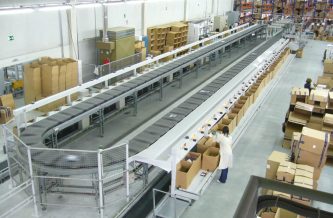Elevating Food Processing Efficiency with Modular Conveyor Belts

The food processing industry requires efficient, hygienic, and adaptable material handling solutions to ensure product quality and safety. Modular conveyor belts, such as Belle Banne’s ModulaveyorTM, provide a variety of benefits and use cases, making them the perfect choice for food processing operations. In this article, we will explore the features of modular conveyor belts and their impact on material handling in the food processing industry.
Features of Modular Conveyor Belts in Food Processing
Modular conveyor systems offer several features tailored for use in food processing environments:
Customisable design: Modular conveyor belts can be tailored to meet the specific needs of a food processing operation, with options for customisable widths, lengths, belt profiles, drive options, and belt materials, including food-grade options.
Easy assembly and disassembly: The modular design allows for quick and efficient assembly and disassembly, making it easy to reconfigure or relocate the conveyor system as needed.
Scalability: The modular nature of these conveyor systems enables them to be easily scaled up or down to accommodate changes in production volumes or facility layouts.
Hygienic design: Modular conveyor belts are designed to minimise food contamination risks and facilitate easy cleaning, ensuring compliance with stringent food safety regulations.
Enhanced safety features: These conveyor systems come equipped with safety guards and other features to ensure safe operation and minimise the risk of accidents.
Benefits of Modular Conveyor Belts in Food Processing
Modular conveyor belts provide several advantages for food processing operations:
Improved efficiency: Modular conveyor belts enable food processors to optimise material handling processes, resulting in increased productivity and reduced downtime.
Enhanced flexibility: The modular design allows for easy reconfiguration and relocation, making it an ideal solution for dynamic food processing environments where production lines and facility layouts may change frequently.
Reduced maintenance: The durable construction and high-quality components of modular conveyor belts ensure long-lasting performance with minimal maintenance requirements, reducing the overall cost of ownership.
Increased food safety: The hygienic design of modular conveyor belts helps minimise the risk of food contamination, ensure compliance with food safety regulations and promote consumer confidence in food products.
Use Cases for Modular Conveyor Belts in Food Processing
Modular conveyors can be utilised in various food processing applications, including:
Ingredient handling and mixing: Modular conveyor belts can be integrated into ingredient handling and mixing processes, ensuring accurate and efficient movement of ingredients throughout the production process.
Packaging and labelling: These conveyor systems can be used to move food products through packaging and labelling processes, ensuring the timely and accurate completion of these critical steps.
Quality control and inspection: Modular conveyor belts can be used to transport food products through quality control and inspection stations, facilitating efficient detection and removal of defective items.
Material handling and storage: These conveyor systems can be used to transport raw materials, ingredients, and finished products within food processing facilities, optimising material handling and storage processes.
Integration with automated systems: Modular conveyor belts can be easily integrated with other mechanical systems, such as robotic arms or vision systems, to create a seamless and efficient food processing operation.
Modular conveyor belts, like Belle Banne’s ModulaveyorTM, offer a range of features and benefits that make them the ideal solution for material handling in the food processing industry. With their customisable design, easy assembly and disassembly, hygienic construction, and enhanced safety features, these conveyor systems can improve efficiency, flexibility, and food safety in food processing operations. As a result, they represent a valuable investment for food processors looking to optimise their material handling processes and enhance overall productivity.


